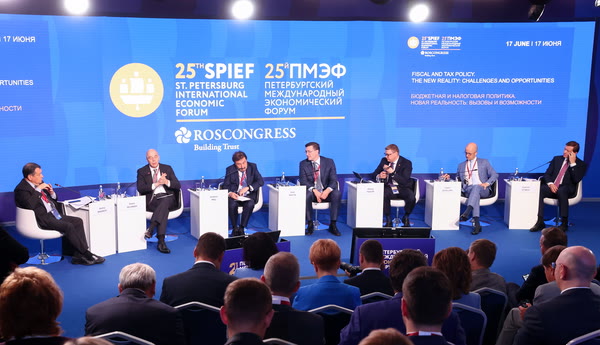
Fiscal and Tax Policy. The New Reality: Challenges and Opportunities
KEY CONCLUSIONS
The Russian economy has enormous potential and a margin of stability
“We have taken a good approach in terms of fiscal policy. We have a low [national] debt. We had solid reserves in the event of such a situation. Our principles and rules have worked. In the current environment, we are cushioning the budget to help people and businesses. If we’re talking about demand, [we have] deferments and increased support for people, pensions, and families with children. We have reduced import duties and are supporting import procurements with subsidies. We are providing additional budgetary resources to inject money into the economy so that our money supply in the economy does not decrease, but, on the contrary, increases,” Minister of Finance of the Russian Federation Anton Siluanov said.
“As our recent business survey shows, European businesses are now experiencing their most difficult time during their presence in Russia. We are grateful that in these difficult times we are finding support from the [Russian] authorities and seeing their readiness to continue working with us. Of course, [European businesses] intend to have a presence, and this is also clearly shown by our recent survey. We are thrilled to announce that in the longer term – over ten years – businesses still expect the Russian economy to have potential and remain interested in it. This encourages us, and we will continue to work for this,” Association of European Businesses (AEB) Chief Executive Officer Tadzio Schilling said.
The Russian government is providing serious support to regional budgets
“When we talk about equal conditions for the regions in terms of inter-budgetary legislation, this is definitely the case. There is the Tax Code and the Budget Code, which clearly regulate these rules. [Russian Ministry of Finance] Anton Germanovich [Siluanov] correctly points out that the Ministry of Finance is allocating serious support for the regions that lack [funds] and has been indexing it lately. This enables us to provide basic services,” Deputy Mayor of Moscow in the Government of Moscow for Economic Policy and Property and Land Relations Vladimir Efimov said.
“Now is the time to ease monetary and fiscal policy if we are here to discuss budgets. But this softening should not last forever. I would like to note that, as I see it, the Ministry of Finance is holding the bar with respect to the regions. Everyone is equal for it. In principle, taking into account certain algorithms, we understand and are forecasting our situation,” Governor of Nizhny Novgorod Region Gleb Nikitin said.
PROBLEMS
A decrease in demand and budget revenues
“According to the forecast for domestic regional product, i.e., the regional economy, we now have a rather optimistic result for industry of 103.3%, although, of course, it was more optimistic four months ago at 110%. So the dynamics have already gone down. In construction, it is already negative at minus 7%, and there has also been a decrease in trade. What do we have the last two months? Imports have declined drastically, exports have increased, and our balance of payments has grown dramatically. We have a 75% drop in lending in construction and a 40% decrease in lending in the economy as a whole. Decreased lending means a decline in investment and business activity, and, of course, this leads to lower profits, and the decrease in profits leads to a decline in regional budget revenues,” Nikitin said.
“The problems we are seeing today in terms of fiscal and tax policy are, of course, risks associated with a decrease in budget revenues. Even though the economy is functioning stably as a whole, we know and see that this is happening in certain sectors, and there are major and serious difficulties for these regions. Here the tax and fiscal policy needs to stand tall. I will give an example from the Chelyabinsk Region. This is a metallurgical region [...] There are already problems today with a decrease in demand, an exchange rate that does not allow exports with an appropriate margin, and so on,” Governor of Chelyabinsk Region Alexey Texler said.
Lack of uniformity in the regions’ financial capabilities
“We have built a system of budgetary federalism that is virtually non-existent. And you can ask the regions the question: when will they be able to manage taxes. We don’t have real federalism. We don’t have budgetary federalism. The regions can only do what is prescribed for them. The aspect related to the problem of federalism is associated with the fact that everything is set up in such a way that the poor will be better off in a crisis because subsidies aren’t going anywhere. And the revenues of a well-developed region that is efficient and builds its tax base will decline. We have a very complex distribution of financial opportunities,” Russian Presidential Academy of National Economy and Public Administration (RANEPA) Rector Vladimir Mau said.
“We understand that the cost of a quality standard is different depending on how large a locality is. To ensure that an educational or medical institution can function in a small village, we understand that they need three to four times more money. We can afford to have a school for a thousand children, and we can have two. The school’s efficiency is several times higher than a school’s efficiency per 100 students in terms of a teacher’s load and the salary that we can provide for such a teacher, and, of course, in terms of the quality of the school itself, because our costs per student will be significantly lower,” Efimov said.
SOLUTIONS
Stimulate growth in demand and strengthen purchasing power
“What should we do now? How should the budget react to current events? We need to support both demand and supply, on the one hand. The budget has such tools. A number of such decisions have already been made. To support demand, we have taken a number of decisions concerning taxes, deferred tax payments, and deferred insurance premiums. Incidentally, entrepreneurs will receive a deferment of [over RUB] 1 trillion […] during this period,” Siluanov said.
“In order for a region to properly develop, there at least has to be purchasing power, [...] then small business and any other will develop, when it is truly interested in coming. If we take a look, quality services are provided for much less money in large regions and cities. It’s time to reconsider our fiscal and inter-budgetary policy in terms of the efficiency of our economy,” Chairman of the State Duma’s Committee on Budget and Taxes Andrey Makarov said.
Pursue a proper investment policy in infrastructure projects
“As much as we would like to, we won’t able to balance out everyone the same in terms of quality and quantity. When we talk about investing and where to invest, it’s important to choose the most effective projects. Even within a city, we understand that we have to invest in what will produce the greatest multiplier effect. By creating, for example, a metro station or building a transport interchange, we significantly increase the appeal of that territory and launch private projects that are already generating income and returning money to us,” Efimov said.
“The main goal, of course, is to not reduce investments. And this is a matter of the fiscal policy. I think that budget investments are a dampener in this way. When there is a risk of a reduction in private investment, public investment should be increased. There is an infrastructure menu, and it needs to be indexed [...] An inter-budgetary menu needs to be offered to the regions. We have regions with limited opportunities. More targeted funds need to be allocated to them to provide a boost,” Texler said.
For more, see the Roscongress Foundation’s Information and Analytical System roscongress.org








